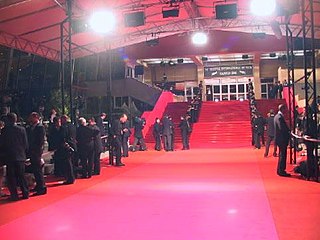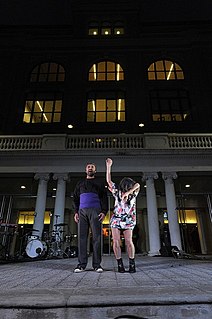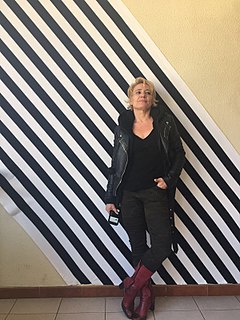
A film festival is an organized, extended presentation of films in one or more cinemas or screening venues, usually in a single city or region. Increasingly, film festivals show some films outdoors. Films may be of recent date and, depending upon the festival's focus, can include international and domestic releases. Some festivals focus on a specific film-maker or genre or subject matter. A number of film festivals specialise in short films of a defined maximum length. Film festivals are typically annual events. Some film historians, including Jerry Beck, do not consider film festivals official releases of film.

Isabel Coixet Castillo is a Spanish film director. She is one of the most prolific film directors of contemporary Spain, having directed twelve feature-length films since the beginning of her film career in 1988, in addition to documentary films, shorts, and commercials. Her films depart from the traditional national cinema of Spain, and help to “untangle films from their national context ... clearing the path for thinking about national film from different perspectives.” The recurring themes of “emotions, feelings, and existential conflict” coupled with her distinct visual style secure the “multifaceted ” filmmaker's status as a “Catalan auteur.”
Òmnium Cultural is a Catalan association based in Barcelona, Catalonia, Spain. It was originally created in the 1960s to promote the Catalan language and spread Catalan culture.

The Centre de Cultura Contemporània de Barcelona is an arts centre in Barcelona, Catalonia, Spain.

The FIAPF based in Paris, created in 1933, is an organization composed with 36 member associations from 30 of the leading audiovisual production countries. FIAPF is also in charge of regulating international film festivals, including some of the world's most important ones.

The São Paulo International Film Festival, also known internationally as Mostra, is an annual film festival held in the city of São Paulo, Brazil. A non-profit event, the festival is organized by ABMIC. The state and city of São Paulo have established October as the festival's official month.
The Geneva International Film Festival // GIFF has been exploring the relationship between cinema, television, and digital creation since 1995.

Barcelona'sculture stems from the city's 2000 years of history. To a greater extent than the rest of Catalonia, where Catalonia's native Catalan is more dominant, Barcelona is a bilingual city: Catalan and Spanish are both official languages and widely spoken. Since the arrival of democracy, the Catalan culture has been promoted, both by recovering works from the past and by stimulating the creation of new works.
European Film Promotion (EFP) is an international promotion organisation and a unique network of 38 national film promotion institutes who represent films and talent from their respective territories. Under the EFP flag, the members team up on initiatives to promote the diversity and the spirit of European cinema and talent at key international film festivals and markets.

Fira Mediterrània of Manresa (Catalonia-Spain) is a performing arts fair rooted in Mediterranean tradition. It has two main areas of focus: popular culture and world music. It has been held every year since 1998 and has become a setting for exchange professionals that sell and buy productions.

The Oxcars are a non-competitive awards ceremony held at Sala Apolo in Barcelona, Spain, in October each year. They are a public showcase that puts the spotlight on cultural creation and distribution carried out under the paradigms of shared culture. Through presentations and symbolic mentions of works in a series of categories, real legal solutions are shown using parody as a strategy. The award categories include: Music, Animation, Theatre, Human Tools, Future Markets and Great Leftovers of Spanish Culture, among others.
Roberto López Corrales, also known by the artistic pseudonym ROLOCO, is a Spanish visual artist and composer.

The Filmoteca de Catalunya is a film archive located in Catalunya, Spain, aiming at the preservation of film and the dissemination of audiovisual and film culture. Its head office and public rooms are located in the Raval neighbourhood, in central Barcelona. The Centre de Conservació i Restauració is located in the Parc Audiovisual in Terrassa.

Manuel Oreste Rodríguez López was a Galician poet and writer.

Isabel Steva i Hernández, whose pseudonym is Colita, is a Spanish photographer. She trained with Xavier Miserachs i Ribalta and Oriol Maspons i Casades, and began her professional career in 1961 as a lab technician and stylist for Miserachs.
The Bophana Center is an audiovisual center located in Phnom Penh, Cambodia. The center is dedicated to restoring, protecting and enhancing the Cambodian audiovisual heritage.

Joan Triadu was a Spanish literary critic, academic and writer. A cultural and resistant anti-Franco activist, he participated in many significant Catalan cultural projects of the 20th century such as the Serra d'Or magazine, the magazine Ariel, Ariel, the newspaper Today or Òmnium Cultural. He was the pioneer in the post-war Catalan courses. In the role of pedagogue, he was the general director of the Cultural Institution of the CIC, an entity that created the Escola Thau Barcelona in 1963 and the Escola Thau Sant Cugat in 1996.

Sol Picó Monllor is a Spanish dancer and choreographer. She has studied Spanish dance, ballet, and contemporary dance, and combines different techniques and languages in her productions in a groundbreaking way. In 1993 she created the Sol Picó Company, with which she has become one of the most heterodox choreographers and dancers of the Spanish contemporary scene. She has received numerous awards, including 10 Premios Max, the National Dance Award of Catalonia (2004), the City of Barcelona Dance Award (2015) and the National Dance Award of Spain (2016).

Lesbians in Francoist Spain had to contend with a culture where a fascist state met with a form of conservative Roman Catholicism to impose very rigid, traditional gender roles. In the immediate post-Civil War period, the new regime was not concerned with homosexuals in general, but instead were focused on changing laws to enforce restrictive gender norms like repealing divorce. While original laws banning homosexuality were on the books and enforced using a 1933 law, they were changed in 1954 and 1970. Unlike male homosexuality, lesbians were less clearly addressed by these laws and were much less frequently prosecuted for the crime of homosexuality. Lesbians from that period are hard to identify because they were not identified as such, and often identified as prostitutes instead.














